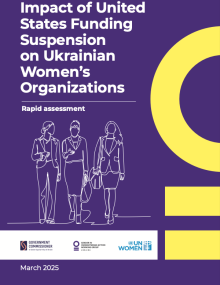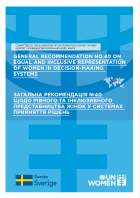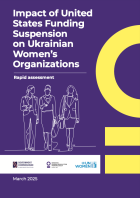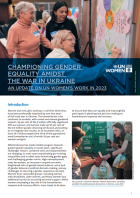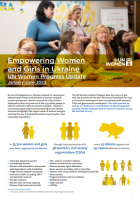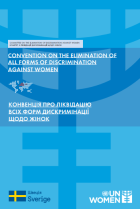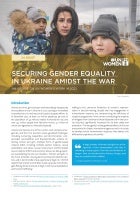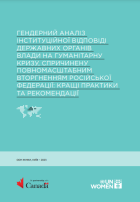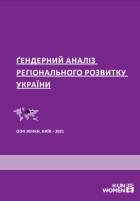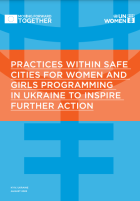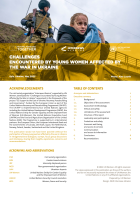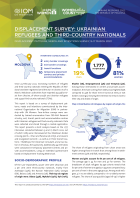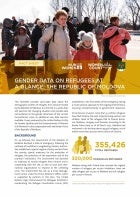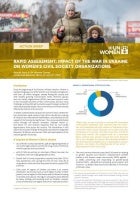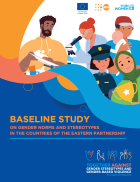1 - 20 of 55 Results
Pagination
Date:
In its comprehensive guidance, officially known as General Recommendation 40, the UN Committee on the Elimination of Discrimination against Women (CEDAW) made it clear that “equal and inclusive representation” requires no less than 50-50 parity between women and men. This undisputable standard ensures equal access for all women and girls within any decision-making system, which the Committee underlined should include public, private sector, political, economic, and digital spaces.
Date:
Women-led and women’s rights organizations (WROs) in Ukraine have been severely impacted by funding suspensions by the United States (U.S), a new survey by UN Women, the Apparatus of the Government Commissioner for Gender Equality Policy of Ukraine, and the Gender in Humanitarian Action Working Group, reveals.
UN Women calls for more direct, flexible, and long-term funding to women’s rights organizations to ensure life-saving programs for women and girls to meet sudden funding gaps.
Date:
To support government bodies in addressing the challenges posed by the war, UN Women Ukraine presents a new Guide on Gender Mainstreaming in Regional and Local Development Strategies for Recovery. This essential resource equips civil servants and officials with practical tools to integrate gender perspectives into strategic documents, ensuring equitable and inclusive development and recovery for all.
Date:
UN Women presents the analytical brief “Women’s economic empowerment in Ukraine during Russia’s Invasion”. The document is based on the latest studies on the impact of Russia's war against Ukraine on women and girls. The report contains valuable information that will help develop initiatives, programs, and policies aimed at the economic empowerment of women and girls in the context of Ukraine's gender-responsible recovery.
Date:
This report presents the results of a study on the impact of the full-scale war in Ukraine on women living with HIV. The report describes how the war has affected the employment, economic, and property status of women living with HIV, how it has impacted their health, and the challenges women have faced in raising children, family planning, accessing HIV services, and seeking help. The research was conducted under the guidance of the community within the framework of the UNAIDS UBRAF Country Envelope and the UN Women in Ukraine project "Transformative Approaches to Achieving Gender Equality in Ukraine", supported by the Office of the Deputy Prime Minister for European and Euro-Atlantic Integration and funded by Sweden.
Date:
Women and men, girls and boys, in all their diversities, have been profoundly impacted by over two years of full-scale war in Ukraine. The humanitarian crisis continues to escalate, with varied and uneven gendered impacts. 56 per cent of the 3.7 million officially registered IDPs are women, and women make up 93 per cent of the 4.6 million people returning to Ukraine and seeking to re-integrate into society. As of December 2023, at least 14.5 million people (one-third of the population) need humanitarian aid, of which 56 per cent are women and girls.
Date:
As the full-fledged war in Ukraine entered its’ second year, addressing the needs and priorities of women and girls remains paramount. Women account for 61% of those displaced by May 2023 and out of the 17.5 million people in need of assistance, 56% are women and girls.1 Women’s civil society organisations (CSOs) working across Ukraine continue to highlight the urgent needs of women and girls and how the war is disproportionately impacting the most vulnerable populations. The UN Women Ukraine Strategic Note for 2023 is in line with the priorities of the UN Transitional Framework for 2023 and has been developed in close consultation with women’s CSOs and government counterparts. This brief provides an update on UN Women’s contributions to advancing gender equality and the empowerment of women in Ukraine, during the first half of 2023.
Date:
Policy Brief: A Gender Responsive Recovery for Ukraine: Introduction
Date:
The Concluding Observations include recommendations to Ukraine to enhance implementation and protection of the rights of women and girls, including living in affected by war in Ukraine areas and internally displaced women, access to justice, education, health care, employment, economic and social benefits.
Date:
Women and men, girls and boys have been deeply impacted by the escalation of war in Ukraine in 2022, causing an immediate humanitarian crisis and massive disruption to peace efforts. Ukraine has become one of the world’s most complex emergencies, and the crisis presents severe gendered challenges, including worsening inequalities and discrimination, compounded vulnerabilities and disproportionate violence affecting women and girls.
Date:
This publication provides analytical conclusions and recommendations for state authorities on gender and human rights mainstreaming into different areas of humanitarian response in Ukraine.
Date:
This publication provides data and analytical conclusions for the implementation of a comprehensive gender equality and human rights-based approach at all stages of the regional policy cycle - from the analysis of basic gender indicators for policy development to its implementation, monitoring and evaluation.
Date:
The “Practices within Safe Cities for Women and Girls programming in Ukraine to inspire further action” compilation of good practices reflecting various approaches used by UN Women and its partners in implementing the Safe Cities for Women and Girls programme in Ukraine was developed in the framework of the United Nations Recovery and Peacebuilding Programme (UN RPP). The United Nations Recovery and Peacebuilding Programme (UN RPP) is being implemented by four United Nations agencies: the United Nations Development Programme (UNDP), the UN Entity for Gender Equality and the Empowerment of Women (UN Women), the United Nations Population Fund (UNFPA) and the Food and Agriculture Organization of the United Nations (FAO).
Date:
This study generates research and evidence on needs and priorities of young women affected by war broken out as a result of the Russian full-scale invasion of Ukraine on 24 February 2022. It is aimed at facilitating advocacy initiatives for young women to voice their concerns and demands. The study is developed by UN Women Ukraine together with NGO Internews Ukraine.
Date:
This report is based on a survey of displacement patterns, needs and intentions commissioned by the International Organization for Migration (IOM) in partnership with UN Women. Face-to-face surveys were conducted by trained enumerators from CBS-AXA Research at entry, exit, transit points and accommodation centres with Ukrainian refugees and third-country nationals.
Date:
The Rapid Gender Analysis seeks to draw attention to the gender dynamics in the war in Ukraine—both preexisting and emerging—and draws out recommendations for humanitarian leadership, actors and donors to ensure consideration of the gendered dimensions of risk, vulnerability and capabilities in response and preparedness to this crisis.
Date:
This report is based on a survey of displacement patterns, needs and intentions commissioned by the International Organization for Migration (IOM) in partnership with UN Women.
Date:
This factsheet provides up-to-date data about the demographic profiles of refugees from Ukraine hosted by the Republic of Moldova.
Date:
Since the beginning of the Russian military invasion in Ukraine, women’s groups and civil society organizations have been quick to react to the immediate priorities of their communities, but face many challenges as they attempt to provide support to large numbers of internally displaced people, host-communities and those directly affected by violence and insecurity. UN Women has conducted a rapid survey to help inform the decision-making of national and international stakeholders, and advocate for the support of civil society during the war.
Date:
This publication presents data and insights about the perceptions of male and female roles in society, employment and leadership, household and family, gender-based violence, sexual relationships and reproductive health in the Eastern Partnership countries and provides recommendations for future programming.
